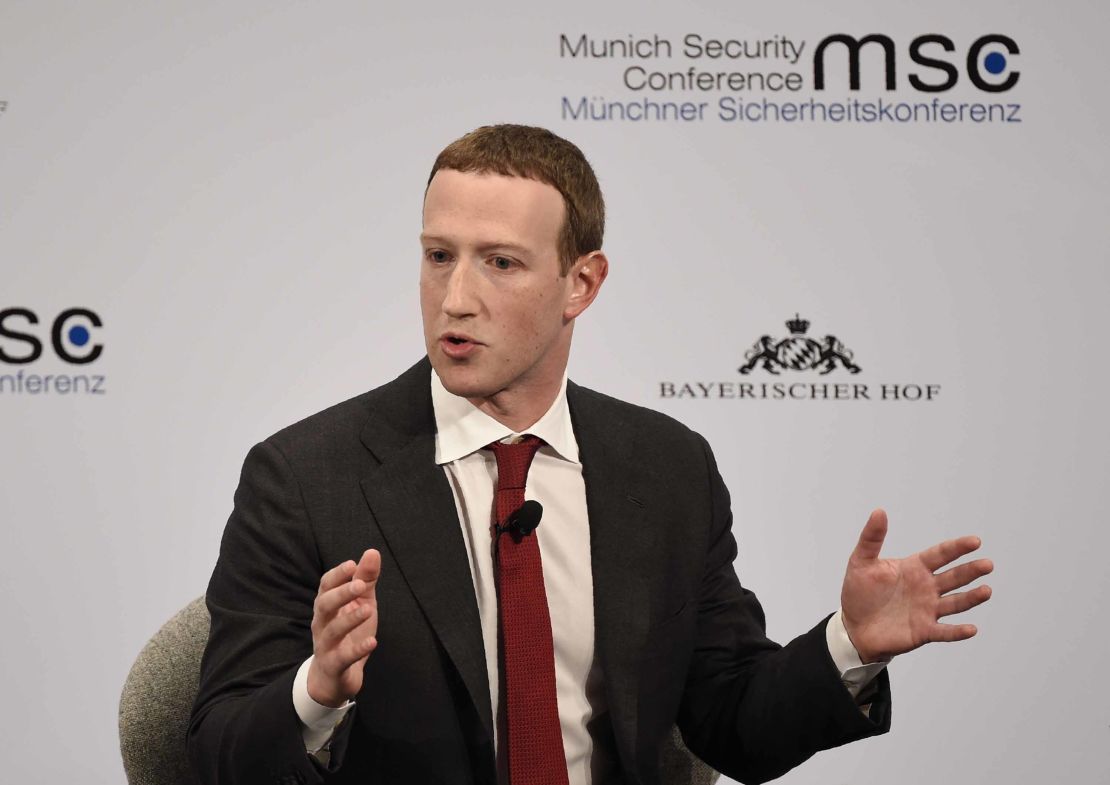Mark Zuckerberg has asked for more regulation of Big Tech companies. Europe is preparing to give him what he wants.
The Facebook (FB) chief, on a trip to Munich and Brussels, is making it clear that he wants governments to provide more rules on data use, privacy and content. The tour comes just days before top EU officials are set to unveil proposals with major implications for tech firms.
“Even if I’m not going to agree with every regulation in the near term, I do think it’s going to be the kind of thing that builds trust and better governance of the internet, and will benefit everyone, including us, over the long term,” Zuckerberg said at the Munich Security Conference on Saturday.
He followed up with an op-ed in the Financial Times on Sunday, asserting that Facebook needs “more oversight and accountability.”
“People need to feel that global technology platforms answer to someone, so regulation should hold companies accountable when they make mistakes,” Zuckerberg wrote.
The latest call to action from Facebook’s founder comes as increased regulation looks inevitable, at least in Europe. On Wednesday, EU leaders will kickstart debate about new rules governing data and artificial intelligence, including facial recognition.
Zuckerberg met Monday with Margrethe Vestager, a highly influential EU commissioner who has imposed billions of dollars in fines on US companies and is leading the bloc’s efforts to set rules governing emerging technologies.

He also spoke with Věra Jourová, the commissioner in charge of values and transparency. Jourová said they had an “extensive debate” about the role of platforms in addressing disinformation and election interference.
“I want to protect European voters from the mechanisms of algorithms which just chase them into the bubble and do not give them the … possibility to make a free choice,” she told CNN Business earlier Monday.
For tech companies, the big question is how far European leaders are willing to go. The European Union and its member states have so far been more aggressive than the United States, confronting Silicon Valley over competition issues and imposing data protection rules that have set a new global standard.
“The EU is leading in this space while the US continues to fall behind, which will likely mean that we will continue to see a pattern of Europeans regulating American companies,” said Alina Polyakova, CEO of the Center for European Policy Analysis, a think tank based in Washington.
The European Commission has hit Google (GOOG) with three antitrust penalties totaling €8.2 billion ($8.9 billion) since 2017. And in December, the Commission launched preliminary investigations into how Google (GOOG) and Facebook gather, process, use and monetize data for advertising purposes.
Last week, Facebook suspended the rollout of its dating service in Europe — planned for the eve of Valentine’s Day — after officials from the Irish data regulator searched its offices. The regulator supervises Facebook because the company’s European headquarters is in Dublin.
Such moves have put pressure on US tech executives to engage closely with leaders on the region. Sundar Pichai, the CEO of Google and its parent company Alphabet, made his own trip to Brussels last month.
“There is no question in my mind that artificial intelligence needs to be regulated,” he said at a conference organized by Bruegel, an economic think tank.
Facebook released a paper on Monday outlining the company’s views on a range of proposed policies for government regulation. The company said it does not support laws that seek to hold platforms liable for content posted by users.
Polyakova said that Zuckerberg’s visit to Europe shows that he’s realized there are advantages to being at the table while the debate unfolds “rather than being on the confrontational path.”
Still, the social media giant faces no shortage of critics. In a letter to Zuckerberg dated Friday, Manfred Weber, the leader of the largest group in the European Parliament, called for Facebook to “show more transparency” on how its algorithms are designed, claiming that regulation would be “the ultimate option” if the CEO didn’t enter into conversations with EU officials.
He pointed to the new coronavirus outbreak as “yet another sad example” of how misinformation can rapidly spread on the platform thanks to “un-transparent algorithms.”
— Sharon Braithwaite, James Frater, Nina dos Santos and Brian Fung contributed reporting.























